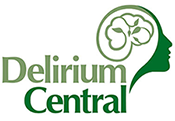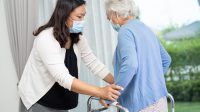Healthy Living: At Home
Healthy Living: At Home
Much of the information on this website is about assisting older patients when they are in the hospital. However, there are many things older adults can do before or after a hospital visit that may help them live healthier day to day lives. There is growing evidence that keeping your body healthy also helps your mind. The top three ways to maintain a healthy brain are physical activity, a healthy diet, and mental activity.
Healthy Body, Healthy Mind
Physical Activity
The Centers for Disease Control and Prevention (CDC) recommend 150 minutes of moderate intensity activity every week if you have no limiting health conditions. This could include a brisk 20-25 minute walk each day.
Physical activity has been demonstrated to prevent chronic disease, help maintain independence, and improve immune function.
Click here for more information from the CDC.
Healthy Diet
A healthy, balanced diet will help your body and mind stay healthy. A healthy diet should include lots of fresh fruits and vegetables, whole grains, and relatively small amounts of fat and sugar.
Avoid excessive drinking. Drinking too much alcohol can damage the liver, heart, and brain. Alcohol can also increase your risk for falls and interfere with certain medications. Click here for more information from the US Department of Agriculture.
Mental Activity
You can exercise your brain as well as your body! Mental activity such as reading, writing, doing puzzles, and playing games helps the brain stay healthy. It may even help prevent delirium. Staying involved in the community through volunteering is another great way to exercise your mind and body.
Talk to your doctor
Regular check-ups with your primary care provider can help you stay healthy and avoid hospitalization.
Use extreme caution with medicine. Take prescriptions exactly as instructed. Talk with your primary care provider if you notice any problems that may be caused by medication, like nausea or confusion. If you are offered a new prescription ask what it is for and if it can be safely combined with what you are already taking.
Safe Environment
Maintain a clean, clutter-free home. For an older person, even a minor fall can cause serious injury. Falls are the number one cause of injury in the older adult population. Keep a non-slip rubber mat in the bathtub and consider installing handrails. Arrange furniture and electronic wires so that there is a clear, unobstructed path from one room to another. Wear non-slip slippers and remove clutter from the bedside. Secure or remove loose rugs. Store necessities within easy reach. Ensure adequate lighting. Check that smoke alarms are working correctly and replace batteries every six months.
Smoking
If you smoke, it is never too late to quit and benefit from improved health effects. Smoking increases the risk for many diseases including cancer, stroke, heart disease, high blood pressure, and bone disease. Smoking can also make pre-existing medical conditions worse. Smokers are more likely than non-smokers to have health problems such as coughing, trouble breathing, and fatigue.
Social Support
Social support can lower stress and contribute to psychological and physical well-being. Accept offers of help or companionship from family and friends. Community-based services such as senior centers, assisted living facilities, and religious organizations can also provide positive social support to help older persons defeat loneliness and isolation.






